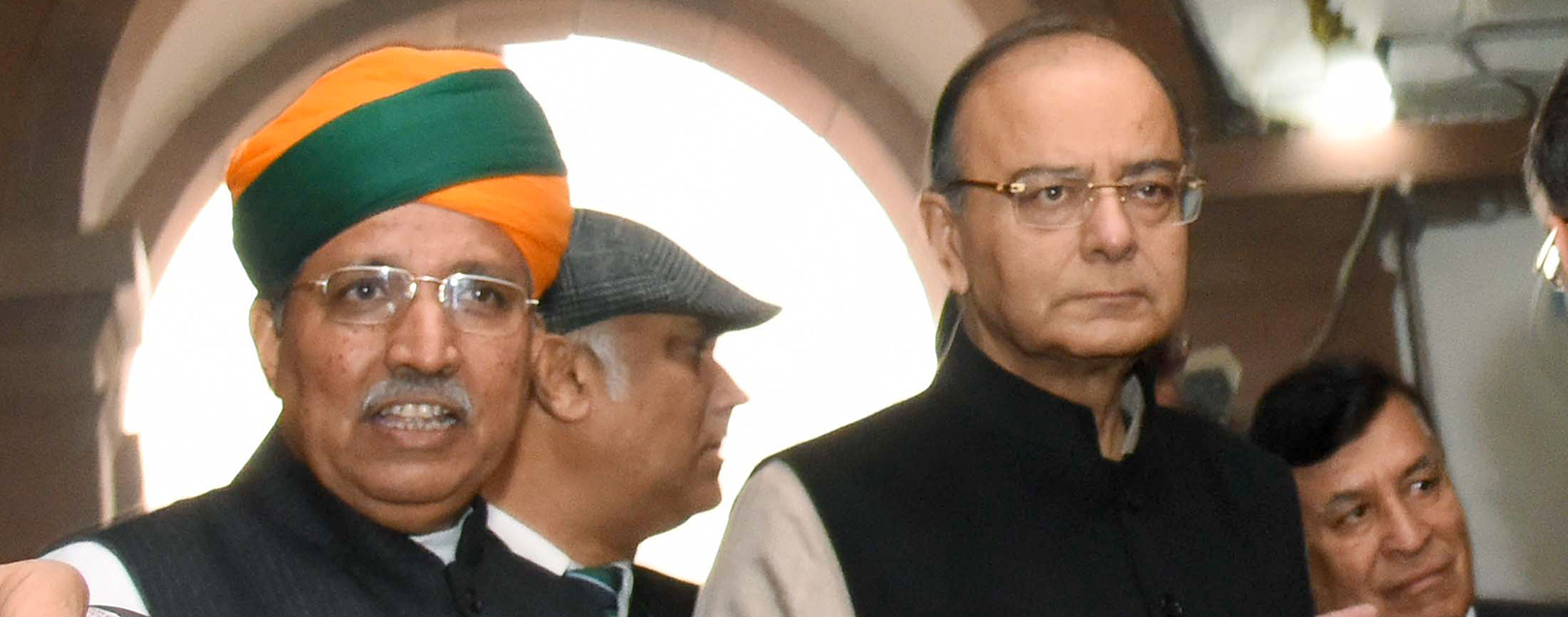
Positive reactions trickle in post-Union Budget announcement
The Dollar Business Bureau
As expected, the focus for the Union Budget 2017 was on black money, demonetisation, crackdown on tax evaders, GST and digitisation of the nation. This was also a first, for the Union and Railway budget, to be presented by the Finance Minister within the same session.
Across sectors, immediate reactions towards the budget were mostly on the positive side. Speaking to The Dollar Business, earlier today, Narendra Bansal, CMD, Intex Technologies said, “It is a progressive and futuristic budget. They have tried to move from a tactical budget to a strategic one - it is policy focussed.” Sunil Kant Munjal, Chairman, Hero Corporate Service welcomed the budget for covering a large spectrum and taking in account all the feedback the government had received. He said, “All other areas except direct tax on large industries has been covered including individuals and small industries. A significant amount of work has been thought on infrastructure area, skills, agriculture, education and innovation.”
KEY HIGHLIGHTS AND REACTIONS
Referring to the fiscal deficit for the budget, Sumit Sawhney, Country CEO and MD, Renault India Operations said, “One thing which is positive is that even though he [the Finance Minister] has made so much of announcement on spending, still the target for fiscal deficit is 3.2 percent, which is a positive thing. We also need to maintain fiscal deficit in the country.”
TAX
Post demonetisation, the country had been waiting for proposals to reduce the personal tax burden on the “honest tax paying population”. While lauding demonetisation as a bold and decisive initiative, Finance Minister Arun Jaitely introduced changes to the tax rates aiming to attract more people to declare their income and pay taxes which would help move India away from its tax non-compliance economy status.
While keeping the tax slabs unchanged, the tax rates for those with income of Rs 2.5 to 5 lakh, rates have been halved to 5%. In addition, a 10% surcharge on people earning between Rs 50 lakhs and Rs 50 lakhs and a 20% surcharge for those earning between Rs 50 lakh and Rs 1 crore was announced.
Reacting to proposals, Naresh Trehan, Founder and Chairman, Medanta – The Medicity said, “I am not sure how much the tax proposals would be beneficial. I am sure it will help the people in some way at 5%. But it doesn't give any major incentive to people above that level to come into the tax bracket voluntarily. The ones who are paying tax will anyway pay.” In his opinion, a higher rebate would have been more beneficial when it comes to attracting people with higher incomes to pay their taxes.
Anshuman Magazine, Chairman, India and South East Asia, CBRE said, “While greater rebates were expected in individual tax rates, the rebate for individuals earning up to Rs 5 lacs will help increase disposable incomes.” This, he said, may help spur consumption and have a positive impact on demand for housing.”
Lauding the proposals as equitable, keeping in mind the limited fiscal room, Ratul Puri, Chairman, Hindustan Power projects said, “I think what he has done to raise the limits are positive. Hopefully, it will get more people into the tax net. In any case, a lot of legislative measures have already taken place in the last one year such as demonetisation, Benaami Property Act etc which will also play a role in widening the tax net.”
Another tax benefit was received by the MSME sector with a proposal to reduce the income tax rate to 25% for smaller companies with an annual revenue of less than Rs 50 crore. The minister highlighted would help make the MSME sector more viable which contributed a major share to the economic activity and provided employment but received very few incentives and ended up paying more taxes than other sectors.
MANUFACTURING
India’s manufacturing sector is currently at 6th position from an earlier 9th. The budget, focused on promoting a manufacturing ecosystem in India, which Finance Minister Jaitely mentioned had already attracted applications from some foreign electronics manufacturers to set up an Indian base. Bansal said, “I don't know how they plan to encourage manufacturing in India, especially for the mobile and electronics industry. A positive impact for our sector is the thrust on going digital which will push up the demand for mobile phones. But besides that, there are no tax breaks that have been announced which we were expecting and which can protect and improve local manufacturing.”
AUTOMOTIVE
In case of the automotive sector, Sumit Sawhney, Country CEO and MD, Renault India Operations said, “We were not expecting anything for the automotive sector today, specifically. We have GST coming in. But if we want more jobs, manufacturing can give more jobs.” He added, “When we talk about manufacturing GDP, 47 percent is automotive and automotive related. Automotive is one of the biggest job creators. So, from that front, if we see, will the demand impact? The answer is yes, all these positive things will get more automative demand.”
REAL ESTATE
For the real estate sector, which received a major blow post-demonetisation, cheer came in the form of the Infrastructure status. Anshuman Magazine, Chairman, India and South East Asia, CBRE said, “Overall, the budget augers well for real estate, affordable housing and the infrastructure segment.” While they still need to take a look at the details of the announcement, he welcomed this long-awaited decision. Magazine added, “This is indeed an important step to promote access to priority lending thereby spurring supply of low cost housing units across various cities in India. Relaxation in area measurement as well as completion timelines to seek tax exemption are welcome steps.”
Another welcome move was the amendment of the airport authority of land act. According to Magazine, the act which will allow development of land around the airports which will further improve infrastructure and more importantly increase funding for the development of the airports. “This is over and above, the record allocation made to the overall infrastructure sector,” he said.
HEALTHCARE
Pradeep Dadha, CEO and Founder of Netmeds, approved of the proposal to amend drug rules which would make the availability of drugs to the masses, a much easier process by amending the Drugs and Cosmetic Rules. “Additionally, we welcome the Government’s initiative of Aadhar-based health record for senior citizens of our country to provide them with healthcare facilities hassle free. Also, the decreased tax slab for the companies in MSME sector will help companies focus more on the expansion of their services,” he added.
In the field of healthcare, another major focus was on improving access to healthcare by converting over 1.5 lakh health sub centres into health wellness centres, announcing the opening of two more AIIMS in Jharkhand and Gujarat. Stressing on the need for more qualified medical professionals, the minister also announced the addition of 5,000 more seats in the post graduate medical programme. “Government’s initiative of ensuring the availability of specialised doctors is a commendable initiative. Our country needs quality healthcare services and by having more Post graduate doctors will benefit people and will help create a healthy nation,” reacted Anshul Mittal, Co-Founder, Konsult app.
FOREIGN TRADE
For the EXIM community, announcements came in the form of setting up of a central scheme in FY2018 - the Trade Infrastructure Export Scheme. The government is expected to allocate Rs. 3,96,135 crores for export infrastructure improvement.
INFRASTRUCTURE
Sumit Mazumdar, Immediate Past President, CII expressed some disappointment about the infrastructure sector. He said, “They are awarding a lot of contracts but there are not enough people to take these contracts. Some of them have got stressed assets. I was looking for that somehow these stressed assets would be released or put aside so that work could continue. That would really give a boost to the economic activity because infrastructure is what helps to give such a boost.” Another disappointment, according to Mazumdar was the absence of any focus with regards to the high-income agriculture sector people also, who he felt could have been brought under the tax net.
SKILL DEVELOPMENT
The point on skill development, Dr Naushad Forbes, President, CII says is a good thing. “Skill requirements for us as a country are very comprehensive and they need to extend across the entire population but, I did not hear anything in the budget that says how it will actually expand our skilling programme across the country.” He adds, “Overall there are many useful things in the budget such as the political funding clause, the corporate income tax clause for MSMEs, the abolishment of the FIPB. This is very sensible and good news on the part of the government.”
Ratul Puri summed up the overall reaction to the budget. He said “It's a very positive budget. One hasn't seen many negatives which I think is a big positive. Everybody was expecting - considering the major states going into elections right now and the budget getting preponed - major electoral sops. So, it's a sensible budget which is important.” Sawhney adds, “But we need to move from doing good things to great things. There is nothing negative in this budget. perhaps the only disappointment, so to say, is that we could have been more aggressive.”






 to success.
to success.